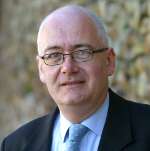Handel’s Orlando has an anonymous libretto based on Ariosto’s epic poem Orlando furioso. Orlando’s madness is at the centre of the story and is given the most elaborate musical treatment, but the rest of the story is a thin one. The heroic Orlando refuses to fight, and when he is rejected by Angelica for Medoro, another counter-tenor role, he goes mad. Dorinda is also in love with Medoro, and the magician Zoroastro (here played as a psychiatrist, much the same thing) restores matters to harmony and brings Orlando back to sanity by the judicious application of electro-convulsive therapy, a treatment unknown in Handel’s day but an appropriate excuse for lighting – and lightning – effects.
Harry Fehr’s production sets Orlando in a 1950’s upmarket psychiatric clinic, with globular lampshades, Crittall windows and a veneered desk in the foyer. In the wards, however, things are grimmer, with iron-framed beds and grim-faced nursing staff played with great comic style by stalwarts of the WNO chorus, including Helen Greenaway, Nicola Morgan and Sarah Pope. Another chorister, Jack O’Kelly, makes innumerable appearances in different costumes as warder, patient, porter and other roles, and manages to steal the scene in each of them.
As Zoroastro, the bass Daniel Grice was in charge of this institution, and opened with his solemn aria ‘Gieroglifici eterni’, the solemnity undercut by the nearby presence of Orlando, his head wreathed in electroencephalographic apparatus while nurses bustle around him. Orlando’s cavatina ‘Stimulato dalla gloria’, accompanied only by solo cello and continuo, immediately demonstrated that Zazzo’s counter-tenor voice is in the fruity, luscious American mezzo-like tradition of David Daniels and Bejun Mehta, rather than the thinner, dryer English sound exemplified by Robin Blaze singing Medoro. The full glory of Zazzo’s performance emerged in the blazing, horn-dominated da capo aria ‘Non fu già’, in which he tackled the semiquaver runs and sequences with virtuosity, ornamenting them even more fully in the repeat section.
Zazzo’s Orlando deteriorates from a stylish figure in air-force costume to a vision-wracked madman in vest and underpants, but manages to preserves shreds of heroism even in the face of adversity. What brings about his downfall is the arrival of the two female characters, the soubrettish Dorinda, played as a nurse by Fflur Wyn (a Handel regular with WNO), and the maturer Angelica, sung by Rebecca Evans in the best frock of the evening, with hat and red wig to match. Wyn’s light, agile voice is ideal for Dorinda’s flirtatious personality, while Evans’s weightier tone brought out the full lyric potential of Angelica’s role.
The production’s farcical elements get even stronger with the appearance of Medoro, pyjama-suited and bedridden (for a moment it seemed that his falsetto voice might be the result of a vasectomy gone horribly wrong), whose reciprocated love for Angelica drives Orlando mad with jealousy. Dorinda’s grief at losing Medoro gained full expression in the beautiful trio ‘Gentil pastorella’ that ended Act 1, with further comedy coming from her repeated refusals to be consoled by Medoro and Angelica.
The five-door farce treatment (complete with dropped trousers) continues into the second act, during which Orlando’s illness swings between bouts of violent rage and confinement in a padded cell. His aria ‘Cielo, se il tu consenti’ was a display of sizzling triplets accompanied by Alessandrini’s spiky strings and oboes. This and other similar numbers might have been more stylistically effective performed on baroque instruments with the appropriate bows, but this is not something that Alessandrini expects or demands of a standard opera orchestra, playing at standard pitch of A=440, as opposed to baroque pitch of A=415, as on most contemporary recordings of Handelian opera. However, with the authentic-sounding theorbos plucking away in the deeper registers of the score, this mismatch did lose something of the unified sound of a dedicated baroque orchestra.
Act 2 ends with Orlando (and the audience) under the illusion that he has murdered both Angelica and Medoro, leaving Dorinda distraught and himself guilt-ridden, although he is on his way back to sanity. In Act 3, Zoroastro zaps Orlando with high-voltage currents applied across the temples, with the scary nurses in attendance with electrodes and swabs. Orlando’s spasms seemed more ecstatic than agonising, which allowed the overall comic tone to avoid descending to the tragic depths of a Jephtha or a Theodora. Returning to his senses, and learning that Medoro and Angelica are still alive, Orlando joins the medical staff and the other characters in a chorus of general rejoicing. This cheerful and witty production, with its outstanding cast and conducting, will do much to maintain WNO’s deserved reputation as a company that can perform equally well across a range of three centuries.




